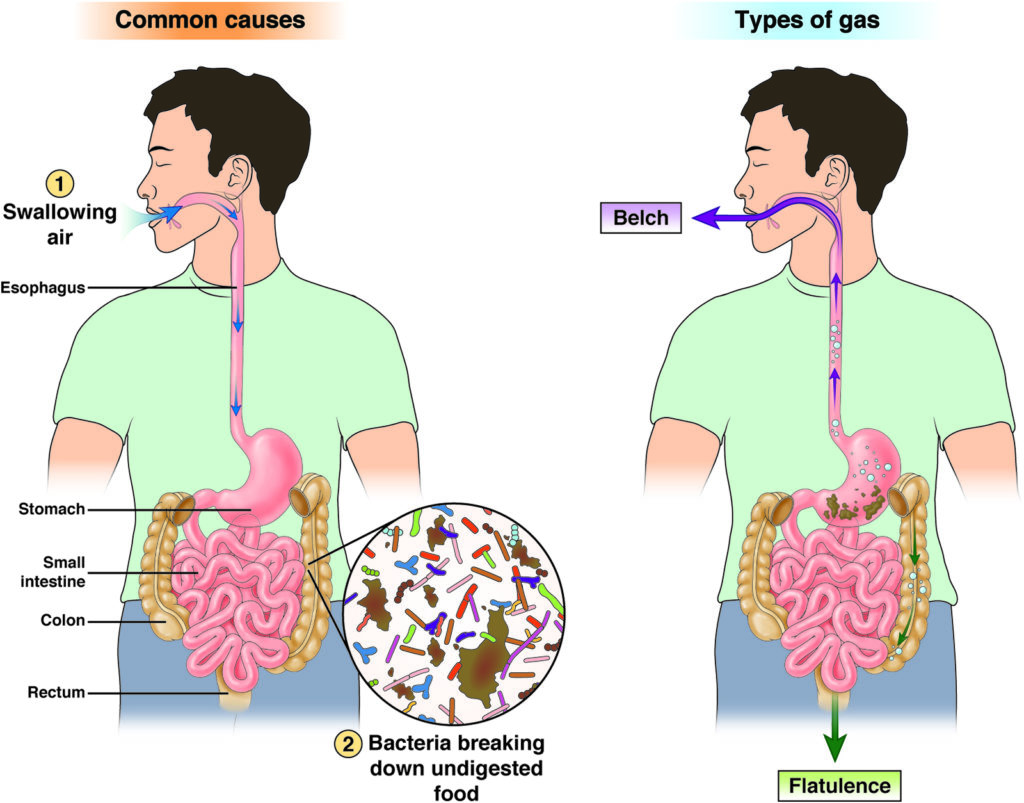What is gas?
Passing gas is normal. Everyone does it.
Gas in the digestive tract is when air builds up in your intestines.
Passing gas through the mouth is called belching or burping. Passing gas through the rectum is called flatulence.
Gas comes from either swallowed air or the breakdown of undigested food by bacteria in the large intestine.
Gas can collect in some parts of the digestive tract, causing bloating (swelling) and discomfort or pain.
Most gas has no odor (smell). When there is an odor, it is caused by bacteria in the large intestine that release small amounts of gases, such as hydrogen sulfide.

Did you know?
The amount of gas that people have is different for each person. Most people pass between a pint and a half gallon of gas each day. Generally, gas is not caused by a disease. If you have a lot of gas that doesn’t go away, tell your doctor.
What causes gas?
The most common cause of gas is swallowed air.
Each time we swallow, a small amount of air enters the stomach. The gas then travels to the small intestine where part of it is absorbed into the body. The rest of the gas travels into the colon to be passed out through the rectum (flatulence). Sometimes, part of the gas is burped out through the mouth instead of going to the intestine.
Some things cause you to swallow more air, including:
- Drinks that are carbonated (have bubbles or fizz).
- Being under a lot of stress.
- Having post-nasal drip.
- Chewing gum.
- Smoking.
- Eating quickly.
- Wearing poor fitting dentures.
Your diet can cause gas.
Certain foods can cause more gas, because they are not fully broken down in the intestine. Once they reach the colon, certain foods are fermented by bacteria, which causes gas.
Large amounts of fiber in your diet can cause gas.
Gas-causing foods
- Cauliflower.
- Brussels sprouts.
- Dried beans.
- Broccoli.
- Smoking.
- Cabbage.
- Bran.
- Artificial sweeteners.
Not having enough lactase, which is an enzyme in the small intestine needed to digest lactose (the sugar in milk and dairy products), can cause gas. Your doctor may suggest not eating dairy products or test to assess if you are lactose intolerant.
Eating large amounts of foods that have fructose, which is a sugar often found in fruits, or high-fructose corn syrup, can cause gas.
Other conditions associated with gas
Frequent burping, along with reflux, could be a sign of GERD, or gastroesophageal reflux disease.
Increased gas and bloating can be seen with small intestinal bacterial overgrowth (SIBO), a condition where the numbers of bacteria in the small bowel are increased above the normal level.
When to call a doctor about gas
Passing gas is a normal bodily function. It’s needed to get rid of gas from your body. If you have the following symptoms, talk with a doctor:
- Persistent or extreme belching (or burping) or flatulence.
- If you feel bloated all the time or have a severe increase in gassiness.
- If your symptoms don’t go away, or get worse, after using at-home remedies.
Treatments for gas
If your gas is causing you pain or discomfort, there are ways to help feel better. If you don’t feel better, talk to your doctor.
Daily habits
- Don’t chew gum or suck on hard candies. Doing so causes you to swallow more air.
- Check with a dentist to make sure your dentures fit the right way.
- Walking, jogging or moving around may help pass gas.
- Don’t drink bubbly or fizzy drinks.
- Eat less foods that have high-fructose corn syrup.
- Try getting rid of milk and milk products, such as cheese. If this helps you feel better, talk to your doctor to see if you might be lactose intolerant.
- Eat less of the foods that are known to cause more gas, such as cauliflower, Brussels sprouts, bran, beans, broccoli and cabbage. Make sure you get fiber in other ways to help balance out your diet.
- Try a low-FODMAP diet.
Over-the-counter (OTC) medicine
There are several OTC medicines that can help get rid of gas for some people.
- Digestive enzymes, such as lactose supplements.
- For gas that is caused by beans or veggies, try a-galactosidase pills.
- Peppermint.



